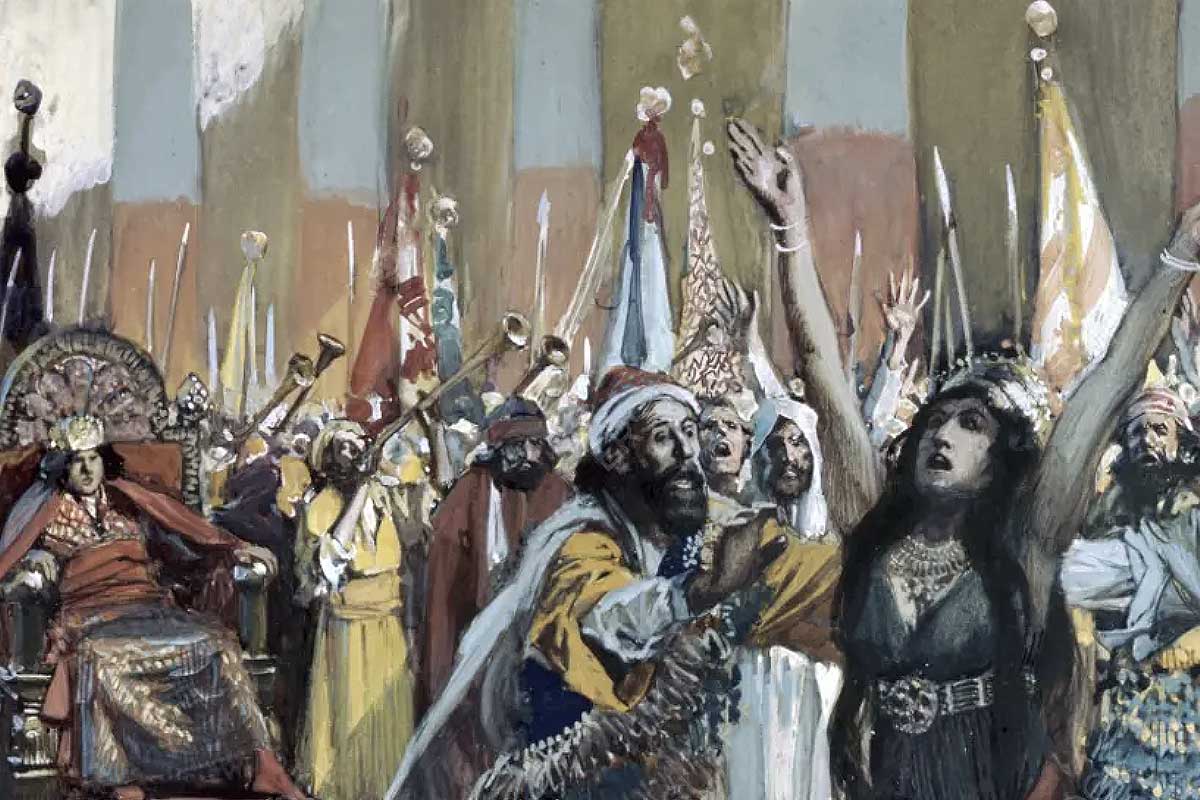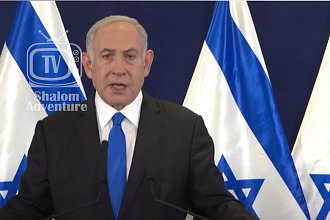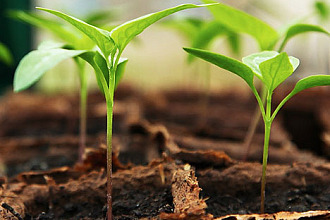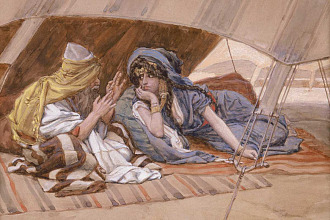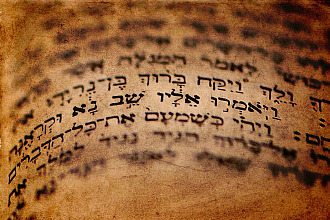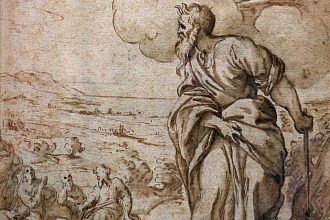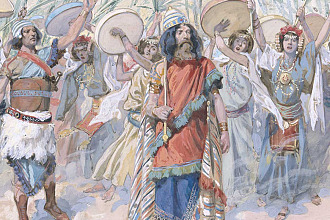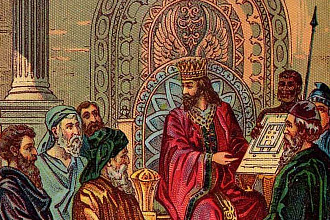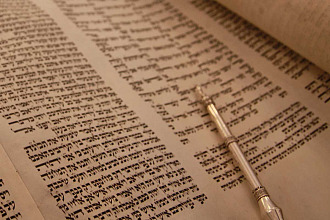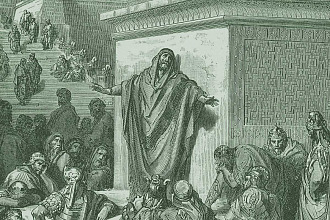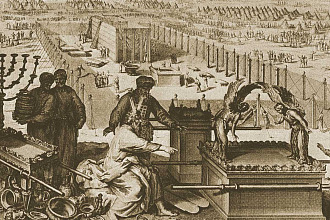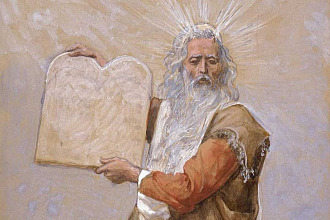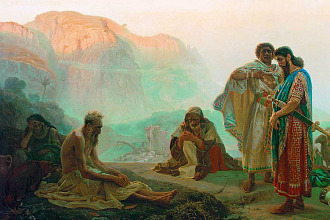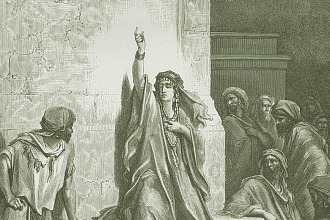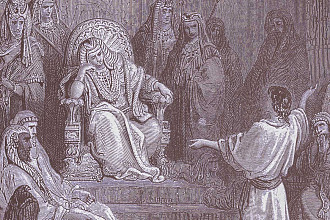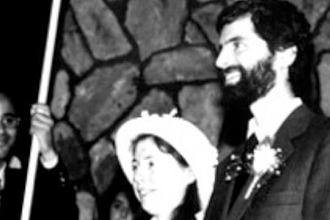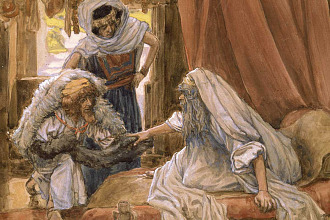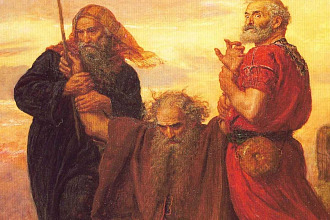Stop and visualize a seven-year-old child you know. Maybe he’s a child of yours, a niece, nephew, or grandchild. Now try to imagine that child being the current Prime Minister of Israel or as the President of your country.
Now that is a shocking thought, isn’t it? Seven years old and head of our nation? Yet at one time Israel was ruled by a seven-year-old boy king; his name was Joash. (He is also sometimes known in the Scriptures as Jehoash.)
The Bible tells us that when Joash was only one year old his father, King Ahaziah, was killed. Joash’s wicked grandmother, Athaliah, decided to take this opportunity to rule the nation. Athaliah was the daughter of two of the most wicked rulers of the Jewish people, King Ahab and Queen Jezebel. Athaliah began her rule by ordering that all of the royal line be killed, which meant the killing of all her children and grandchildren. Joash was the only one of royal line that survived. Joash survived because his aunt hid him in the temple. He remained there for six years while his grandmother, Athaliah, reigned over the land. When Joash turned seven years old all of Judah united with the cohen gadol (the high priest) and the Levites in crowning and anointing the child Joash. They held a grand celebration proclaiming him their king. And they clapped their hands and shouted, “Long live the king!” 2 kings 11:12. When Queen Athaliah heard this she cried out, “Treason, Treason!” Athaliah and her followers were slain. Thus, our youngest king, Joash, began his reign at seven years of age.
1. What was the first thing the cohen gadol did after making Joash king?
...solemnized a covenant between himself and the people and the king that they should be the people of the LORD. 2 Chron. 23:16
First they committed themselves to the LORD. This is what we have been doing as we have been studying the Scriptures together. Committing our lives to the LORD is the first thing we should do. Before we try to overcome any habits or change anything in our lives it all must start with first committing our lives to the LORD. Committing ourselves to the LORD is not a one-time decision. It is a choice with which we begin every day. If you have never committed your life to the LORD, don’t read any further. Stop right now and surrender your heart to Him in prayer. If you have committed your life to the LORD in the past but have not yet today recommitted your life to Him, stop right now and make that recommitment.
2. What was one of the good things Joash did as king?
Joash decided to renovate the House of the LORD. 2 Chron. 24:4
He could have decided to renovate the king’s palace or his gardens or his stables, but he chose to renovate the House of the LORD.
3. Where did the money to renovate the House of the LORD come from?
The king ordered that a chest be made and placed on the outside of the gate of the House of the LORD...all the people gladly brought it and threw it into the chest till it was full. They did this day by day, and much money was collected. 2 Chronicles 24:8, 11
This was a free will offering. People gave freely as Elohim moved their hearts. The funds did not come from taxes or state dollars. They came from the people. The people brought the money gladly because they had first committed their hearts to the LORD. When God has our hearts and His Spirit is living in us obedience and giving become a joy. Obedient joyous giving is a miracle that happens when God is in our lives.
4. During the time of Moses where did the money come from to build the first temple?
Everyone who excelled in ability and everyone whose spirit moved him came, bringing to the LORD his offering for the work of the Tent of Meeting and for all its service and for the sacral vestments. Men and women, all whose hearts moved them, all who would make an elevation offering of gold to the LORD, came bringing brooches, earrings, rings, and pendants—gold objects of all kinds. Exodus 35:21,22
From the first Jewish temple until now God expects His people to participate in the physical work of building up, maintaining, and funding the work of the LORD. In this first example people gave from their hearts and they gave up the ornaments of the world. Instead of decorating themselves they committed to decorating God’s house.
5. What do the Scriptures call it when we give financially out of the goodness of our hearts?
...offering your freewill contribution according as the LORD your God has blessed you. Then Hezekiah said, “Now you have consecrated yourselves to the LORD; come, bring sacrifices of well-being and thanksgiving to the House of the LORD. Deuteronomy 16:10; 2 Chronicles 29:31
Again we see the proper order demonstrated. After we have consecrated ourselves to the LORD contributions will freely and thankfully come forth from our hearts for the House of the LORD.
6. According to the Psalms why would anyone want to freely give money away?
I love the LORD for He hears my voice, my pleas; for He turns His ear to me whenever I call... I invoked the name of the LORD, “O LORD, save my life!” The LORD is gracious and beneficent; our God is compassionate. The LORD protects... He saved me. Be at rest, once again, O my soul, for the LORD has been good to you. You have delivered me from death, my eyes from tears, my feet from stumbling. I shall walk before the LORD in the lands of the living. I trust [in the LORD]... How can I repay the LORD for all His bounties to me? I raise the cup of deliverance and invoke the name of the LORD.I will pay my vows to the LORD in the presence of all His people... O LORD, I am Your servant, Your servant... You have undone the cords that bound me. I will sacrifice a thank offering to You and invoke the name of the LORD. I will pay my vows to the LORD in the presence of all His people, in the courts of the house of the LORD, in the midst of Jerusalem. Hallelujah. Psalm 116:1-10, 12-14, 16
Several reasons are listed in this text for wanting to give to the LORD. The first reason listed is because we love the LORD. This should be our main reason. The psalm also mentions that we give as a symbol of our gratitude, as a sign of our thankfulness that God hears our voice, that He turns His ear to us, and is gracious, beneficent, and compassionate. He protects us, saves us, and is good to us. He delivers us from death, crying, and stumbling. He promises everlasting life in Heaven. With such a great God as this how could we hold back from wanting to give him our hearts and our offerings, especially when those gifts will be used in building up His house so that others can come to know of His great love?
7. How is it that we have been able to acquire any money at all?
Remember that it is the LORD your God who gives you the power to get wealth. Deuteronomy 8:18
It is not our talents, wisdom, diplomas, or skills that get us wealth; it is the LORD our God who gives us the power to use the talents, wisdom, education, and skills that He has given us. It is God who gave us a mind to get the diplomas. It is God who gave us hands, feet, eyes, and skills to use them. In a moment, during a disaster or horrendous accident, all our own abilities can be removed from us. All that we are able to do is because Elohim has given us the ability to do it. Thus, He really is the One who has given us the power to earn money. Moses tells us to remember this.
8. Since it is God who gives me the ability to acquire wealth, what would be the logical response of thanks that I should show for all the wonderful things God has done for me?
Honor the LORD with your wealth, with the best of all your income, And your barns will be filled with grain. Proverbs 3:9, 10
We should give God the best, or first of our income, not what is left over, not used stuff that we don’t want anymore. God has given us His best. He deserves our best.
9. Follow the order here: God gives me the power to get money. Then I show my appreciation by giving back the best, or first, of that income. The Bible calls it the “first fruits.” How does God then promise to respond?
Honor the LORD with your wealth, with the best of all your income, And your barns will be filled with grain. Proverbs 3:9, 10
Bring the full tithe into the storehouse, and let there be food in My House, and thus put Me to the test—said the LORD of Hosts. I will surely open the floodgates of the sky for you and pour down blessings on you. Malachi 3:10
God gives, we give back, then God gives again, and so on. The only ones who can break the cycle are you and me. The Sea of Galilee, in Israel, is full of fish and life. The Jordan River flows in and flows out. Yet the Dead Sea, down river from Galilee, is dead. The Jordan River flows in but the Dead Sea does not let any water flow out. It tries to keep it all to itself. If we do not allow God’s blessings to flow through us eventually our hearts grow stagnant and die. If we are not thankful and responsive to that thankfulness in blessing others the end result is death.
10. How did Abraham show his appreciation for God’s goodness to him?
[Abram] gave him a tenth of everything. Genesis 14:20
Abraham gave ten percent of all that he had to Melchisedec, the minister of God.
11. How did Jacob show his appreciation for God’s goodness to him?
“The LORD shall be my God... and of all that You give me, I will set aside a tithe for You.” Genesis 28:21, 22
Jacob, like his grandfather Abraham, set aside a tithe or ten percent for God.
12. What did Elohim specifically tell Moses concerning the tithe?
All tithes...are the LORD’s; they are holy to the LORD. Lev. 27:30
The tithe, or first ten percent, of all that God has given to us is holy to the LORD. It is set apart specifically for God’s ministers. The tithe is different from the freewill offering that helped build the temple. The freewill offerings are over and above the ten percent and are used for the building and congregational expenses.
13. What does God call it when we do not give Him back the 10% tithe and the freewill thank offerings?
Ought man to defraud God? Yet you are defrauding Me. And you ask, “How have we been defrauding You?” In tithe and contribution. You are suffering under a curse, yet you go on defrauding Me. Malachi 3:8, 9
Here again we see a distinction between the tithe (first 10%) and free will offerings or contributions. If we are stingy in either of these areas God says we are defrauding or stealing from Him and that we are under a curse. Pretty strong words from God! Stealing is a bad enough sin, stealing from God clearly shows if we have committed ourselves to Him or not. All the things we have been learning in these Jewish Heritage Scripture Studies demonstrate whether or not we have surrendered our hearts to God and if we are allowing Him to be the LORD of our lives. Possibly more than any other thing, how willingly and cheerfully we are willing to give of our finances might be the best indicator of who is most important to me, God or myself. A person might be nice to others so that others will be nice to them. We might choose to eat right so we will be healthy. We might like having Sabbaths off work so we can get a break. And we might like going to services just so we can have friends. But to willingly and cheerfully give of our finances takes a transformed heart.
14. According to King David, who really owns everything?
...the earth is the LORD’s and all that it holds, the world and its inhabitants. Psalm 24:1
Elohim really owns everything we have. He owns the world. He has given us the ability to get wealth, so He really is the owner of it all. He lets us manage it. God requires we return 10% of what is really His and then He allows us to choose what percentage we want to give Him as a freewill offering out of the 90% he leaves for us to manage and use.
If your neighbor lends you his lawn mower and you return it to him are you doing any great deed? No, you are just doing what is right; you are returning what belongs to your neighbor. If you gave him a gift of appreciation then you are doing something extra that he did not ask for. When we return God’s tithe to Him we are just giving Him back what He tells us is His. We start being generous when we give freewill offerings on top of the ten percent.
Giving back God’s ten percent tests our obedience and trust. The freewill offerings above the tithe demonstrate our love and thankfulness to God.
15. What is life like for someone who refuses to allow Adonai to give him a generous heart?
Now thus said the LORD of Hosts: Consider how you have been faring! You have sowed much and brought in little; you eat without being satisfied; you drink without getting your fill; you clothe yourselves, but no one gets warm; and he who earns anything earns it for a leaky purse... Because of My House which lies in ruins, while you all hurry to your own houses! Haggai 1:5, 6, 9
Do you sometimes feel this way? Do you sometimes feel like you have been working a lot and getting a little, or that you are never satisfied with what you have, or that you never seem to have enough? Does it ever seem like what you earn just leaks out as if there is a hole in your pocket? Could it be because you have not understood how God’s arithmetic works? Have you been trying to put yourself first and God second?
Remember everything we have God has given us the ability to get so He really has given to us first and He instructs us to put Him first from the money He has given us the ability to get. Y’shua gave a wonderful promise; “Give, and it shall be given unto you; good measure, pressed down, and shaken together, and running over...” (Matthew 6:38, King James Version)
16. According to Moses, how important is this topic?
When you make a vow to the LORD your God, do not put off fulfilling it, for the LORD your God will require it of you, and you will have incurred guilt. Deuteronomy 23:23
17. If you are afraid that you could not make it financially if you willingly gave back to God what is His, you can surrender these fears to God and He will give you faith. If you realize that you are at heart selfish and do not want to give what you feel you have earned, you can surrender those feelings to God also and He will give you His generous righteous Spirit. Remember how He changed Jacob to Israel? He is still in the heart-changing business. That is why the Messiah died, to take away our guilt, our selfishness, our fears. Listen again to how David prayed for forgiveness and transformation.
“Indeed I was born with iniquity... Have mercy upon me, O God, as befits Your faithfulness; in keeping with Your abundant compassion, blot out my transgressions. Wash me thoroughly of my iniquity, and purify me of my sin; for I recognize my transgressions, and am ever conscious of my sin. Purge me with hyssop till I am pure; wash me till I am whiter than snow. Hide Your face from my sins; blot out all my iniquities. Fashion a pure heart for me, O God; create in me a steadfast spirit. Do not cast me out of Your presence, or take Your holy spirit away from me. Let me again rejoice in Your help; let a vigorous spirit sustain me. I will teach transgressors Your ways, that sinners may return to You.” Psalm 51:7, 3, 4, 8-15
This prayer is a perfect example for us to use as a model for our prayers of confession. Put the prayer into your own words and tell Elohim your specific area of need whether selfishness, fear, greed, etc. and ask Him to give you His pure generous spirit.
18. What does David tell us will be the result of giving Y’shua our fears, guilt, and selfishness and accepting His righteousness?
The righteous is generous and keeps giving. Those blessed by Him shall inherit the land...Though he stumbles, he does not fall down, for the LORD gives him support. I have been young and am now old, but I have never seen a righteous man abandoned, or his children seeking bread. He is always generous, and lends, and his children are held blessed. Shun evil and do good, and you shall abide forever. For the LORD loves what is right, He does not abandon His faithful ones. They are preserved forever... The righteous shall inherit the land, and abide forever in it. Psalm 37:20-29
God makes us righteous by His transforming power and part of being made righteous is being made generous. The righteous are not only generous but they keep on giving. Those who allow God to transform their hearts to make them righteous and generous will inherit the land – the heavenly land with no mortgage and no taxes!
In Judaism we use the term tzedakah to indicate generosity, when the word really translates as righteous. Righteousness, generosity, love, and charity are not separable characteristics. Each of these characteristics becomes ours as God fills us with His Spirit.
In putting God first we count out the tithe before we consider our needs or other expenses. God’s 10% comes out of our increase. God’s portion comes first. God comes before taxes, God comes before the country we live in. God comes before bills, God comes before wants, God comes before needs. As we put God first He will make sure the rest is taken care of. He will not abandon us. He will bless us and take care of us. Putting Him first takes faith and trust. That is why our first lesson, on Abraham, was on faith. It is faith in the beginning and faith all the way through that leads us to the Promised Land. Elohim will give us the faith we need as we ask Him for it.
19. There is an old saying: you cannot serve two masters; you cannot serve God and money. Where your treasure is, there shall your heart be also. This is very true, isn’t it? Who did Joshua decide to serve?
“Now, therefore, revere the LORD and serve Him with undivided loyalty... and serve the LORD. Or, if you are loath to serve the LORD, choose this day which ones you are going to serve... but I and my household will serve the LORD.” Joshua 24:15
Do you want to serve God with an undivided loyalty? Are you willing to serve Him with every aspect of your life, including your finances? I know those are the decisions you have been making as we have studied God’s Word.
Imagine for a minute that you have been out of work for sometime and your financial situation is getting really rough. You finally find a job as a hired hand on a large farm owned by a nice man named Ivan Canaday. He has good equipment and teaches you how to use the high tech irrigation system he has. After many days of long hours and hard work you harvest his crop and bring it into his silos. The next day Mr. Canaday invites you to come to the market with him. On the way back he asks you to count up the money. It is more than you have seen at one time in a long time, $60,000. Mr. Canaday asks you to separate $6,000 to give back to him and tells you to keep the remaining $54,000. You exclaim, “It’s a deal.”
Would you be happy with that arrangement? It doesn’t take much thought, does it? Really it is no different than what God does with us. God gives us minds, talents, and muscles as tools to get wealth, He allows us to work on His land (He owns everything), and then he lets us keep 90% of all that He helps us acquire. That’s a deal!
Allow God to quietly speak to you for a minute. Where is your heart, where is your treasure, where are your loyalties? Are they caught up in getting money and getting the things that money buys? Or is God most important to you. Think about these questions personally. Where are my thoughts primarily focused? Where do I use the time God has entrusted to me? How do I use the money that God has given me the power to get? Who do I really love the most, myself or God? Who do I put first with my finances, myself or God? Who will I choose to serve today?
Elohim has an overwhelming passion to see the good news of His love for the human family told everywhere. Since it costs for that to happen, He has chosen to finance the project by putting resources in the hands of His people. As we give joyously, we demonstrate that our hearts beat in tune with His... our goals are the same as His. Those are the kinds of people He can safely trust with eternal life.
Some of the biggest questions that occupy peoples minds have to do with the topic of what happens when we die. Your next lesson will explore this intriguing topic and cover such questions as: What will God do with those who have rebelled against Him? Is there a heaven? Is there a hell? What is death like? If there is a heaven how do I get there and what is it like? All of this and more will be covered in your next Jewish Heritage lesson titled, "The Ultimate Promised Land."
This lesson is adapted from "Jewish Discoveries," by Jeff Zaremsky, to buy the printed book, click here.

